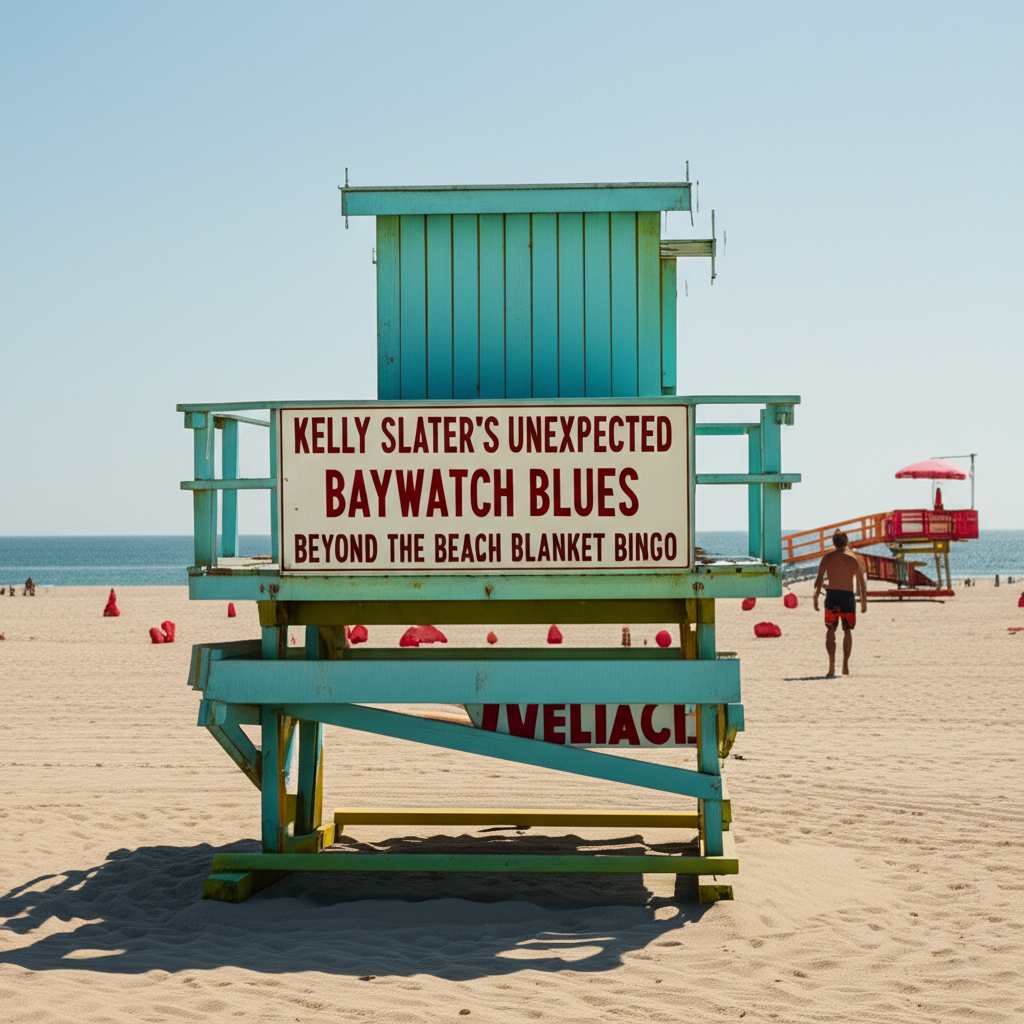Kelly Slater’s Unexpected Baywatch Blues: Beyond the Beach Blanket Bingo
Surfing Icon Recounts Unhappy Stint on Iconic TV Show
Kelly Slater, a name synonymous with professional surfing and a true legend in the sport, recently shed light on an unexpected chapter of his life: his time on the set of the globally popular television series, Baywatch. While many might imagine the experience as a sun-drenched, idyllic interlude, Slater’s account, shared through news.com.au, paints a starkly different picture, revealing considerable dissatisfaction during his tenure on the show, which ran from 1989 to 2001.
From the Waves to the Studio: A Surprising Pivot
Slater, who achieved his first of a record 11 world surfing championships in 1992, joined the cast of Baywatch as Jimmy Slade, a character who had a romantic connection with Caroline Holden, played by Yasmine Bleeth. The show, famous for its slow-motion beach runs and dramatic lifeguard rescues, was a global phenomenon, captivating audiences with its ensemble cast and picturesque California setting. For an athlete at the height of his athletic prowess and already a household name in the surfing world, the move to acting might have seemed like a natural progression or a lucrative side venture. However, according to Slater, the reality was far from glamorous.
The Grueling Reality of a Television Set
Slater’s primary contention with his Baywatch experience appears to stem from the stark contrast between the demands of professional surfing and the rigors of television production. He reportedly found the long hours, repetitive takes, and the overall artificiality of the studio environment to be a stark departure from the freedom and natural flow of competitive surfing. While the exact details of his contractual obligations or the specific duration of his appearance are not extensively elaborated upon in the provided summary, his sentiment suggests that the experience did not align with his passion and lifestyle.
The summary highlights his discomfort, stating he “hated” being on the show. This strong language suggests a profound disconnect between his personal expectations and the professional reality. It’s understandable that an elite athlete, accustomed to the direct feedback and physical demands of their sport, might struggle with the more abstract and often slow-paced nature of filmmaking. The competitive spirit and instant gratification inherent in sports are rarely replicated on a film set, which involves meticulous planning, multiple retakes, and waiting for cues.
Comparing Athleticism and Acting: A Different Arena
For Slater, the appeal of surfing lies in its connection to nature, the raw physical challenge, and the direct competition against oneself and others. The environment of a television set, with its controlled conditions and staged scenarios, likely felt stifling compared to the open ocean. His reported misery suggests that the experience was not merely a minor inconvenience but a significant source of unhappiness, impacting his overall enjoyment of his career at the time.
It’s important to note that the summary focuses on Slater’s personal feelings and does not delve into the production’s perspective or the show’s reception of his performance. The article presents Slater’s viewpoint as the central narrative, detailing his negative emotional experience. While Baywatch was a massive commercial success and provided a platform for its cast members, individual experiences within such large productions can vary dramatically. The show was known for its visually appealing cast and dramatic storylines, which may have appealed to a broad audience but not necessarily to everyone involved in its creation.
The Trade-offs of Crossover Success
Slater’s confession serves as a reminder that crossover success into different industries is not always a smooth transition. While an individual might excel in one field, the skills, environment, and demands of another can present significant challenges. For athletes, the highly structured and disciplined life of training and competition often differs vastly from the collaborative and often unpredictable world of entertainment. The allure of Hollywood or television fame can be powerful, but it comes with its own set of pressures and requirements that may not suit everyone.
The narrative also implicitly raises questions about the pressures and expectations placed upon successful athletes to engage in activities outside their primary sport. While these ventures can offer diversification and financial rewards, they also require a willingness to adapt and potentially step outside one’s comfort zone. Slater’s candidness about his dislike for the experience suggests that authenticity and personal fulfillment remained paramount for him, even when faced with opportunities that might seem universally desirable.
Key Takeaways from Slater’s Baywatch Experience
- Kelly Slater, a celebrated surfing champion, openly expressed his unhappiness during his time on the TV show Baywatch.
- He reportedly found the television production environment to be a stark contrast to the freedom and physicality of professional surfing.
- The long hours, repetitive nature of filming, and artificiality of the studio setting were cited as contributing factors to his dissatisfaction.
- Slater’s experience highlights the challenges athletes can face when transitioning into entertainment careers, emphasizing the differing demands and environments of these industries.
- His candid account underscores the importance of personal fulfillment and authenticity, even when pursuing lucrative or high-profile opportunities outside one’s core expertise.
Ultimately, Kelly Slater’s revelation about his Baywatch stint offers a candid glimpse into the personal realities behind the glamorous facade of television. It reminds us that even iconic figures can find themselves in situations that do not align with their passions, and that true success often involves navigating these personal challenges with honesty and integrity.


Leave a Reply
You must be logged in to post a comment.